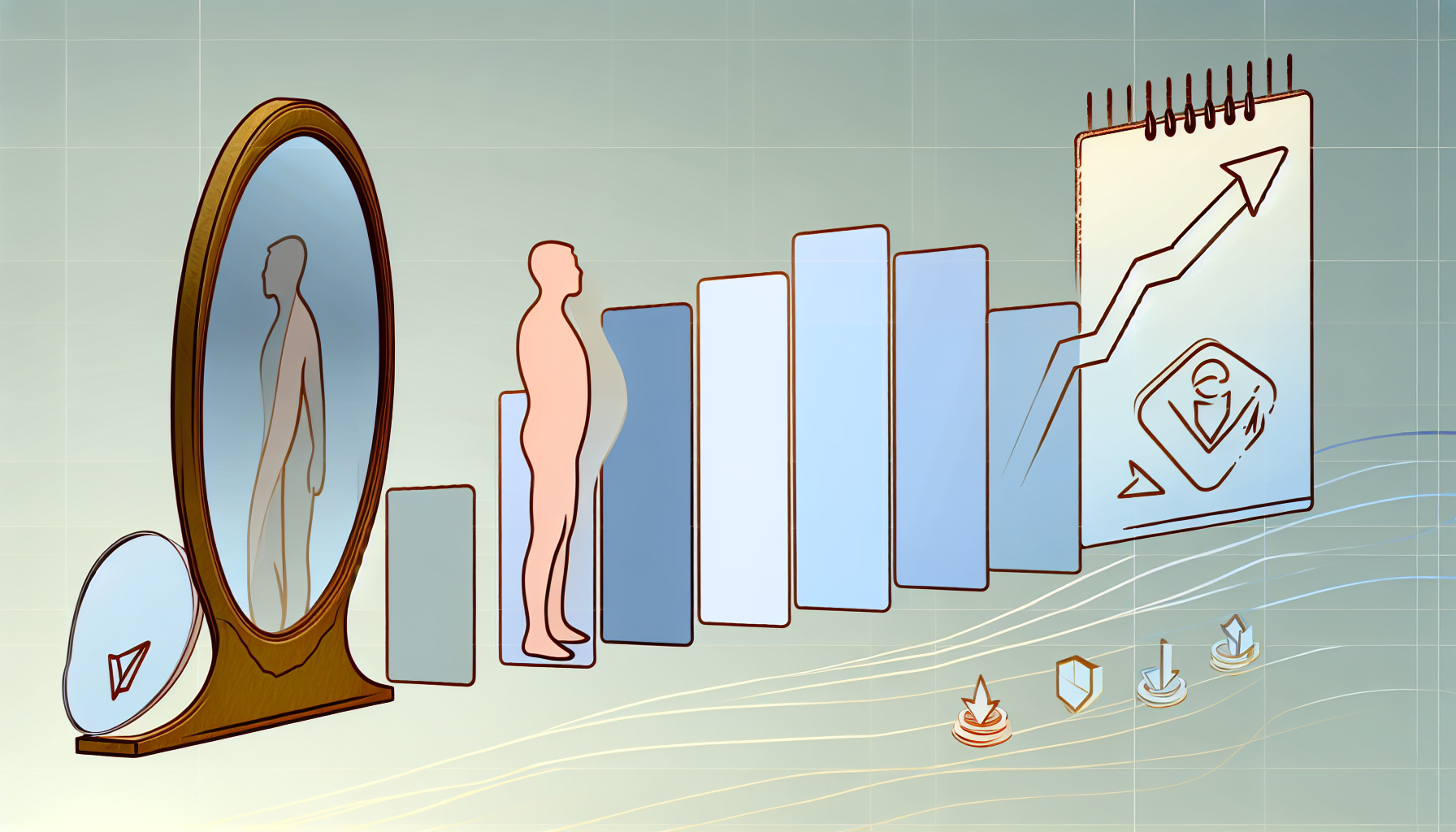
Self-reflection is a vital process that involves examining one’s thoughts, feelings, and experiences. This introspective practice allows individuals to gain deeper insights into their values, beliefs, and motivations. Engaging in self-reflection is an essential component of personal development and emotional intelligence, as it promotes self-awareness—the first step toward meaningful growth.
The significance of self-reflection cannot be overstated. It enables individuals to evaluate their actions and decisions critically, leading to a greater understanding of how these choices align with their core values. By developing an awareness of one’s emotional responses and cognitive patterns, individuals are better equipped to navigate challenges, enhance decision-making, and foster healthy relationships. This heightened level of self-awareness ultimately serves as a catalyst for personal growth, as it encourages individuals to confront and address their weaknesses while celebrating their strengths.
In this context, journaling emerges as a potent tool for facilitating self-reflection. It provides a structured format in which individuals can document their thoughts and experiences, allowing for an in-depth exploration of various aspects of their lives. Through the act of writing, individuals not only clarify their thoughts but also create a tangible record of their journey toward self-discovery. Journaling encourages the practice of mindfulness, as it compels individuals to slow down and process their emotions and experiences in a deliberate manner.
As one engages in the practice of journaling, it is essential to cultivate an environment conducive to self-reflection. This can be achieved by establishing a routine, setting aside dedicated time each day, and approaching the process with an open mind. By integrating journaling into one’s life, self-reflection becomes an accessible and impactful strategy for enhancing self-awareness and fostering personal growth, ultimately leading to a more fulfilling and meaningful life.
Journaling is a versatile practice that serves various purposes, enabling individuals to reflect on their thoughts, emotions, and experiences. There are several forms of journaling each with its unique benefits. Among the most popular are gratitude journals, reflective practice journals, and free writing. Each type offers different approaches to understanding oneself and promoting mindfulness.
A gratitude journal focuses on cultivating a sense of appreciation. By regularly noting down things one is thankful for, individuals can shift their mindset from negativity to positivity. This practice not only enhances emotional well-being but also fosters resilience during challenging times. The act of identifying specific moments of gratitude encourages deeper awareness of daily experiences, which can be transformative in understanding personal values and priorities.
Reflective practice journals, on the other hand, provide a structured approach to self-exploration. This type of journaling often involves responding to prompts or questions that encourage deep reflection on one’s experiences. By analyzing their actions and reactions in various situations, individuals can identify patterns in their behavior, leading to improved decision-making and personal growth. This reflective approach enables readers to gain insights into their emotional triggers, motivations, and aspirations.
Free writing is another form that promotes spontaneity and creativity. This unstructured approach allows individuals to express their thoughts without the constraints of grammar or style. Through free writing, individuals can uncover hidden feelings, fears, and desires that may not surface in more structured forms of journaling. This unrestricted flow of ideas aids in clearing mental clutter and can lead to profound realizations.
Overall, journaling acts as a powerful tool for mindfulness, providing a safe space to record innermost thoughts and feelings. Through consistent practice, individuals can analyze their emotions and experiences more deeply, facilitating a greater understanding of themselves and enhancing emotional intelligence.

Self-reflection stands as a fundamental component of personal development, with journaling serving as an effective tool in this introspective process. One of the primary benefits of self-reflection through journaling is the enhancement of self-awareness. When individuals engage in the regular practice of writing down their thoughts and experiences, they create a space to articulate their feelings and examine their behaviors. This introspection allows for deeper insights into one’s motivations and patterns, leading to a more profound understanding of oneself.
For example, someone grappling with stress may journal about daily events that triggered their anxiety. By revisiting these entries, they may delineate common themes that emerge, aiding them in recognizing specific environments or situations that exacerbate their emotional state. Over time, this heightened awareness can empower individuals to develop coping mechanisms tailored to their unique challenges.
Furthermore, journaling promotes the improvement of emotional intelligence (EI). As individuals reflect on their personal experiences, they learn to recognize not only their own emotions but also the feelings of those around them. By documenting interactions and reactions, one can better discern how their emotions influence their interactions. Such practice contributes to enhanced empathy, a key quality of emotional intelligence, enabling individuals to navigate social situations with greater sensitivity and understanding.
Additionally, journaling cultivates emotional growth. As people chronicle their journeys, they often confront past experiences, learn from mistakes, and celebrate successes. This reflective practice encourages resilience, fostering a mindset that embraces growth through adversity. One notable example is that of a person who journals their progress while overcoming a significant personal setback. By recording their journey, they not only track their growth but also develop a narrative of hope and strength, transforming their perspective on fragile moments in life into opportunities for learning.
Beginning a journaling practice can be an enriching experience that fosters self-reflection and personal growth. First and foremost, it is essential to choose the right journal. This decision can significantly influence your motivation and willingness to write. Consider selecting a journal that resonates with you aesthetically, whether it is a simple notebook or a beautifully designed diary. The act of writing in something you find appealing can enhance your journaling experience.
After securing your journal, it is crucial to set aside regular time for journaling. Consistency is key in developing any new habit, and establishing a specific time each day or week to write will help solidify this practice. Whether you prefer mornings to set the tone for the day or evenings to reflect on your experiences, find a time that works best for you and stick to it. Over time, you may find that this scheduled time becomes a sanctuary for contemplation and self-discovery.
Creating a comfortable writing environment can also facilitate a productive journaling session. Choose a quiet space where you feel relaxed and free from distractions. This could be a cozy corner of your home, a park, or even a café that inspires creativity. The ambiance should promote a sense of tranquility so you can focus on your thoughts and feelings without interruptions.
In addition to the physical space, consider incorporating rituals that enhance your journaling practice. This might include lighting a candle, playing soothing music, or sipping a warm beverage as you write. Such practices can help signal to your mind that it is time to engage in reflective writing. By thoughtfully choosing your journal, establishing a routine, and cultivating a conducive writing environment, you will be well on your way to effective journaling and deeper self-understanding.
Engaging in self-reflection through journaling can be transformative, offering insights that enable individuals to better understand their personal values, beliefs, and aspirations. To aid in this exploration, a variety of journaling prompts can be employed. Each prompt is designed to evoke thoughtful responses and foster deeper self-awareness.
One effective prompt is: “What are three core values that guide my life, and how do they manifest in my daily actions?” This question encourages individuals to identify and evaluate their guiding principles, helping to clarify what truly matters to them. Another thought-provoking prompt is: “What life experiences have significantly shaped my current beliefs?” Reflecting on pivotal moments in life can uncover insights about how one’s worldview has developed.
To help uncover inner desires, consider the prompt: “If I could do anything without fear of failure, what would it be?” This question challenges individuals to think beyond limitations and explore their authentic aspirations. Similarly, asking, “What are the recurring themes in my dreams or daydreams?” can offer valuable information about one’s subconscious yearnings.
Additionally, reflecting on relationships can be enlightening. For instance, “Who do I admire most, and what qualities do they possess that I aspire to emulate?” This not only reveals personal traits to cherish but also encourages the individual to contemplate how they can integrate these qualities into their own character. Lastly, the prompt “What does success mean to me?” is essential for understanding personal definitions of achievement and fulfillment.
Incorporating these journaling prompts into a regular self-reflection practice can facilitate a profound journey of self-discovery, allowing individuals to better comprehend their identity and navigate their life’s path with intention.
Embarking on a journaling journey can be a transformative experience, yet individuals often encounter several obstacles that hinder their practice. One prevalent challenge is writer’s block, a situation where individuals find it difficult to articulate their thoughts and feelings on paper. This can stem from anxiety about self-judgment or the pressure to produce profound insights. To combat writer’s block, it can be helpful to establish a consistent journaling routine, allowing oneself to write freely without self-censorship. Setting a timer for a short duration, such as five or ten minutes, encourages spontaneity and reduces the fear of writing poorly.
Another common issue many face is the perceived lack of time. In a fast-paced world filled with numerous obligations, allocating time for self-reflection can seem daunting. To address this, one might consider integrating journaling into existing routines, such as jotting down thoughts during a morning coffee or before bedtime. Additionally, keeping a portable journal or a note-taking app on a mobile device allows for on-the-go entries, ensuring that journaling becomes a seamless part of daily life.
Many individuals also struggle with feelings of vulnerability, which often accompany the process of self-exploration through journaling. Writing about personal experiences can stir up uncomfortable emotions or memories. To foster a sense of safety, it is crucial to approach journaling as a private activity meant solely for personal reflection. Using prompts can provide guidance and facilitate deeper introspection while minimizing discomfort, as they offer a specific focus that can ease the mind. Ultimately, overcoming these challenges demands patience and commitment, fostering a sustainable journaling practice that leads to valuable self-discovery.
Mindfulness is an essential component that significantly enhances the journaling experience. It involves being fully present and engaged in the moment, which can profoundly influence one’s ability to reflect and articulate thoughts and emotions. By incorporating mindfulness techniques into journaling practices, individuals can foster a deeper understanding of themselves and their experiences.
One effective technique to promote mindfulness during journaling is to begin with a brief meditation session. This practice allows individuals to clear their minds of distractions and cultivate a state of awareness. A simple meditation technique involves focusing on the breath. By inhaling deeply through the nose and exhaling slowly through the mouth, one can quiet the mind and center their thoughts before beginning to write. This transition into journaling can lead to more authentic expressions and insights.
In addition to meditation, deep breathing exercises can heighten mindfulness while journaling. Taking a few moments to practice deep or diaphragmatic breathing helps to anchor the individual in the present moment. This focus on breathing can reduce anxiety and create a calm atmosphere, allowing for a more profound exploration of emotions and reflections. As a result, the writing process becomes less about producing content and more about connecting with oneself.
Another technique is to set an intention before journaling. This might involve identifying a specific aspect of life one wishes to explore—such as feelings, experiences, or goals. By acknowledging this intention, the journaling practice becomes more purposeful, promoting an increased sense of awareness and focus. Such tailored approaches ensure that journaling isn’t merely a mechanical act but rather a mindful exploration of one’s inner landscape.
Incorporating mindfulness into journaling creates a framework for deeper self-understanding. By integrating these practices, individuals can unlock richer insights, leading to greater personal growth and emotional clarity.

Engaging in self-reflection through journaling allows individuals to gain valuable insights into their thoughts, emotions, and behaviors. However, the true value lies in the ability to transform these insights into actionable steps that promote personal growth. To effectively turn reflections into action, one must first identify specific themes or patterns that emerge from their journal entries. This involves reviewing entries periodically to discern prevalent issues or recurring thoughts that may indicate areas of one’s life requiring attention.
Once these insights are identified, setting tangible goals becomes essential. Goal-setting establishes a clear path for growth and improvement. It is advisable to employ the SMART criteria—meaning goals should be Specific, Measurable, Achievable, Relevant, and Time-bound. For instance, if journal reflections indicate a struggle with work-life balance, an individual might set a goal to allocate specific hours for family time, thus enforcing boundaries with work responsibilities.
Incorporating lessons learned from self-reflection into daily routines is crucial for holistic development. Individuals can create action plans that include small, progressive steps leading towards their goals. This may involve daily affirmations, scheduled breaks for reflection, or implementing new habits that align with the insights gained. Consistently revisiting journal entries can serve as reminders, enabling individuals to stay accountable to their commitments and monitor their progress.
Ultimately, transforming insights into meaningful actions requires dedication and intentionality. By actively engaging with recorded reflections and setting purposeful goals, individuals can navigate their personal development journey more effectively. This proactive approach cultivates self-awareness, enhances emotional intelligence, and promotes a fulfilling life grounded in self-understanding.
Regular self-reflection through journaling serves as a vital tool for personal development, enabling individuals to evaluate their progress effectively. The practice of journaling encourages a continuous cycle of introspection, allowing one to document thoughts, feelings, and experiences over time. By reviewing past entries, individuals can gain valuable insights into their growth and development, identifying patterns that might influence their current state of being.
A key element in evaluating progress is the ability to recognize recurring themes and behaviors within one’s journal entries. For instance, noting down not just the events of each day, but also the emotions and reactions tied to those events, can reveal underlying patterns in behavior and decision-making. This self-examination fosters a deeper understanding of how one reacts to challenges or successes, guiding future choices and strategies for personal growth.
Moreover, identifying these patterns can highlight areas that require further attention or improvement. When individuals regularly engage in this self-reflective process, they are better equipped to set realistic goals and make informed decisions about their future. This could involve adjusting habits that hinder progress or reinforcing those that promote positive change. As the practice of journaling becomes more routine, the ability to track growth and adapt becomes increasingly refined.
Additionally, periodic evaluations serve as motivation, showcasing the strides made toward personal goals, whether they pertain to emotional well-being, relationships, or career aspirations. By taking the time to assess past entries, the results provide a clearer picture of one’s personal journey, affirming progress and encouraging further exploration. Ultimately, this deliberate practice of evaluation can propel personal development, fostering a more profound understanding of self within the context of one’s life experiences.
Self-reflection serves as a fundamental pillar in the pursuit of personal growth and emotional intelligence. Research indicates that individuals who engage in self-reflective practices, such as journaling, often experience enhanced self-awareness and relational understanding. A study conducted by the American Psychological Association found that engaging in reflective writing can significantly improve problem-solving skills, reduce stress, and foster emotional clarity. These findings suggest that the deliberate practice of self-examination can nurture one’s psychological well-being.
Additionally, a landmark study by Dr. James Pennebaker, a pioneer in expressive writing research, demonstrated that writing about personal experiences can lead to profound emotional healing and psychological improvement. Participants who journaled about their thoughts and feelings exhibited lower levels of stress and anxiety. This provides compelling evidence that regular self-reflection through journaling not only aids in emotional expression but also contributes to improved mental health over time.
Furthermore, insights from cognitive psychology highlight how self-awareness, cultivated through reflective practices, is closely linked to emotional intelligence. Daniel Goleman, a prominent psychologist, posits that self-awareness is a core component of emotional intelligence, which enables individuals to recognize their emotions and the emotions of others more accurately. This recognition, fostered through self-reflection and journaling, facilitates stronger interpersonal relationships and better decision-making skills.
Incorporating structured journaling techniques into daily routines can further enhance self-reflection. Research suggests that maintaining a consistent journaling practice allows individuals to track their emotional responses and behavioral patterns over time, leading to greater insight and personal development. Thus, the science behind self-reflection substantiates its benefits, highlighting how this powerful tool—particularly when combined with journaling—can propel individuals toward greater self-awareness and emotional maturity.
Journaling has served as a transformative tool for many individuals, allowing them to navigate through their thoughts and emotions with greater clarity. One such account comes from Sarah, a young professional who struggled with anxiety and self-doubt. Initially hesitant to write, she began journaling after a friend encouraged her to document her feelings. Over time, Sarah found that articulating her thoughts onto paper provided a cathartic release. She noted significant improvements in her mental health, as journaling became a safe space where she could confront her insecurities without judgment. Eventually, she utilized her journal to set clear goals and track her progress, ultimately fostering a sense of resilience and empowerment.
Similarly, John, a retiree, shared his experience of using a journal to cope with significant life changes. After losing his spouse, he felt a deep sense of loneliness and confusion. Through journaling, John found solace in expressing his grief and reflecting on the shared memories they held. This introspective practice helped him process his emotions and gradually rediscover his identity outside of being a partner. He often found that reviewing his entries allowed him to appreciate the full spectrum of his relationship and inspired him to engage more fully in life again. Journaling assisted him in not only remembering his loved one but also in embracing new opportunities and friendships.
These personal narratives underline the profound impact journaling can have on self-discovery and growth. The act of writing fosters a deeper understanding of oneself, leading to significant transformations in both mindset and emotional well-being. Individuals who engage in this reflective practice often emerge with a stronger sense of clarity and purpose, as seen in Sarah and John’s journeys. Their stories exemplify how journaling can provide a framework for personal development, helping individuals navigate life’s complexities with greater confidence.

Engaging in self-reflection through journaling is not merely a passing trend; it offers profound long-term psychological and emotional benefits that significantly contribute to an individual’s personal development. Over time, the practice of journaling fosters a deeper understanding of one’s thoughts and feelings. By consistently documenting experiences and reflections, individuals can identify patterns in their behavior and thought processes, leading to informed decision-making.
One of the major long-term benefits is enhanced self-awareness. This heightened self-awareness is critical for personal growth, as it allows individuals to better understand their motivations, strengths, and areas for improvement. As people revisit their journal entries, they can track changes in emotional responses and coping mechanisms, thus gaining insights into how they handle different situations. This ongoing process of self-discovery aids in developing a solid foundation for emotional intelligence, which is essential in navigating social interactions and managing relationships.
Furthermore, maintaining a journaling practice encourages emotional regulation. When individuals articulate their thoughts and feelings, they can process and manage their emotions more effectively. This practice of reflection can lead to reduced stress levels and improved mental well-being over time. As people confront their challenges through the written word, they may find clarity and resonance, empowering them to approach their lives with a more positive and constructive mindset.
Additionally, long-term self-reflection through journaling can serve as a tool for goal setting and achievement. By frequently assessing their aspirations and ambitions, individuals can remain focused on their objectives, facilitating continuous development throughout their lives. Such practices encourage resilience and adaptability, essential traits for overcoming life’s challenges. Thus, incorporating journaling into one’s routine can lead to lasting benefits that enhance both psychological and emotional well-being, ultimately contributing to a fulfilling and enlightened life.
The journey of self-reflection through journaling is an invaluable tool for personal development. Engaging in this practice allows individuals to delve deeper into their thoughts and emotions, uncovering insights that might otherwise remain hidden. Journaling fosters a better understanding of oneself, cultivating a sense of awareness that contributes significantly to one’s emotional intelligence and overall growth. By regularly reflecting on experiences, reactions, and feelings, one can identify patterns and triggers that inform future behavior.
Moreover, the act of putting pen to paper not only aids in clarifying thoughts but also serves as a form of emotional release. This self-exploration taps into the nuances of personal experiences, empowering individuals to embrace their narratives wholeheartedly. Journaling enhances self-awareness, encouraging a recognition of strengths and weaknesses while fostering resilience through the acknowledgment of challenges faced. This balance equips individuals with the tools to respond thoughtfully rather than react impulsively to life’s ups and downs.
As one continues along this path of reflection, it becomes clear that understanding oneself is a continuous process. Every entry in a journal contributes to a broader picture of who you are, nurturing the growth of insights that lead to increased self-acceptance. Each written word serves as a stepping stone toward greater emotional intelligence, enabling one to navigate life’s complexities with a heightened sense of clarity and empathy.
Therefore, embracing your self-reflective journey through journaling is not merely an exercise in writing; it is a profound commitment to personal growth and exploration. By acknowledging the significance of this process, you set the stage for a more enriched life, characterized by authentic self-understanding and continuous development. The insights gained through journaling will ultimately assist in building a more fulfilling and intentional existence.
Looking to advertise, promote your brand, or explore partnership opportunities?
Reach out to us at
[email protected]









Chose where you want to study, and we will let you know with more updates.